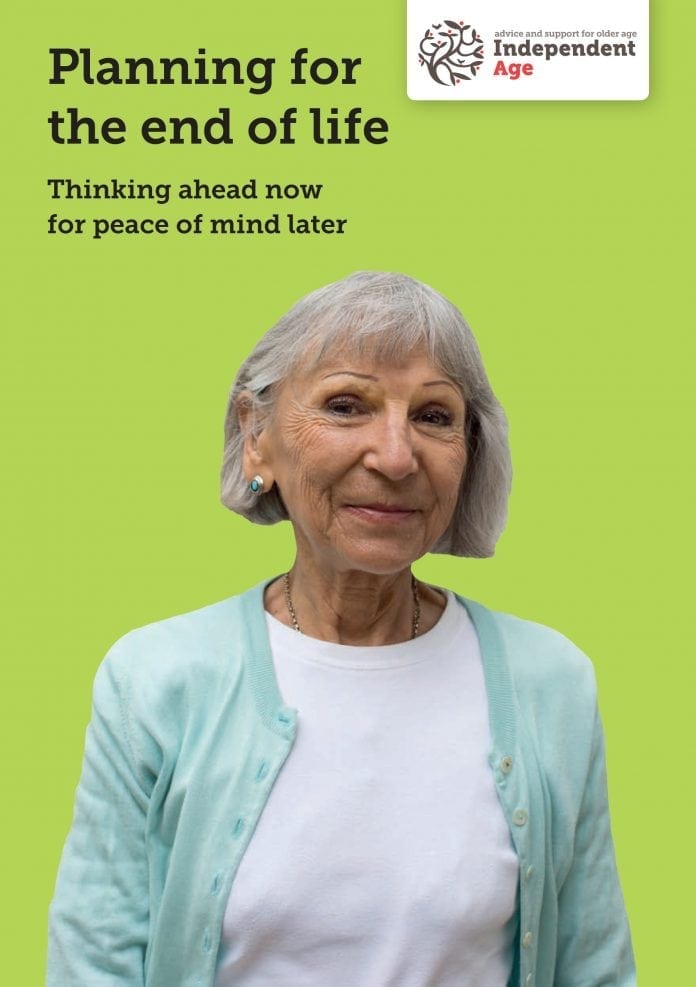Tips for planning for the end of life
Lucy Harmer, Director of Services at Independent Age, the older people’s charity, gives her expert advice on the things to think about when planning for the end of life. The charity has launched a free advice guide: Planning for the end of life: Thinking ahead now for peace of mind later, which can be ordered for free viaindependentage.org/endoflifeplanningor by calling 0800 319 6789.
- Plan ahead
Thinking about death can be upsetting, and many of us find it a difficult subject to talk about with our loved ones, but it’s important to make your wishes known as early as possible, and update them regularly.Talking about death won’t bring it closer, but will allow you to be in control of decisions that may need to be made in the future andmake things easier for your friends and family.Making plans now can give you all peace of mind.
2. Talk to other people about your plans
It can be very difficult to start the conversation, but it’s a good idea to talk to those around you about your plans. It will give you the reassurance that people know your wishes for the future and where to find key documents such as your will, and let you offer each other emotional support. Think about what you want to say beforehand, and let peopleknow in advance that you’d like to talk about this. This gives them time to prepare themselves so theydon’t feel ambushed.
3. Think about all aspects of the end of life
Planning for the end of life isn’t just about thinking about what would happen to your property and finances after you die, it’s also about thinking about your care and wellbeing at the end of your life. This could include considering where you would prefer to die, for example, at home, in a care home or in a hospice.
4. Get support and advice
Whether or not you have a life-limiting illness, there are organisations you can go to for advice and support about planning for the end of life. For example, Compassion in Dying and Dying Matters provide free information and can signpost you to further support.
5. Consider practical matters
When talking to those around you about the end of your life, it’s easy to overlook practical considerations. For example, do people know where to find a list of your bank accounts, or whether you’re on the Organ Donor Register? If you’ll be survived by a partner, do they know where to find information about bills they need to pay, how to work the heating system, or whether your death will affect their income?
5. Write a will
It’s important to make a will and keep it up-to-date so your wishes about who inherits your property and other assets can be carried out. Having a will also makes sure you won’t pay more Inheritance Tax than you should. If you die without a will, the law will decide what happens to your money and property when you die, which may not be the same as what you would have chosen.
6. Think about your wishes for your health and care
There are a number of ways you can record your wishes, in case there comes a time when you’re unable to make or communicate decisions. For example, are there are any life-sustaining treatments you might want to refuse in certain situations?You might want to put them in writing with an advance statement or advance decision, or grant someone you trust a lasting power of attorney for health and welfare to make decisions for you or help you make them.
6. Think about your wishes for your finances
As well as making a will, you might want to set up a lasting power of attorney for property and financial affairs. This lets you appoint someone to make decisions about your money and property, or help you to make them. For example, your attorney could manage your bank accounts or collect your pension for you.If you would like advice about how to do this, you can call the Independent Age helpline for free on 0800 319 6789 and arrange to speak to an adviser.
7. Find out about financial support
If you become unwell and need help to care for yourself, there may be financial help available. For example, many people who need care at the end of their life will qualify for a disability benefit. Call the Independent Age helpline on 0800 319 6789 to arrange a free benefits check.
8. Plan your funeral
If you have clear ideas about what you want your funeral to be like, make sure you let your friends and family know. Planning ahead will not only mean that your wishes are respected, but will also make it easier for your friends and family after your death, especially if you’ve already paid for your funeral or started a payment plan. Think about whether you want a religious or secular ceremony, whether you want to be buried or cremated and what music you would like to be played. Independent Age has a handy free funeral planner tool available at independentage.org/funeral-planner.
Help keep news FREE for our readers
Supporting your local community newspaper/online news outlet is crucial now more than ever. If you believe in independent journalism, then consider making a valuable contribution by making a one-time or monthly donation. We operate in rural areas where providing unbiased news can be challenging. Read More About Supporting The West Wales Chronicle
























